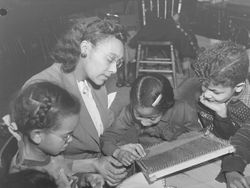August 2024: assinajaq and the CCA host the film festival Tillitarniit—home, body, land. Outdoor Inuit games and film screenings on the façade of the CCA presented in Park Baile as part of the fourth edition.
June 2024: Presentation on Afrofuturism and reimagining community architecture at the Little Burgundy and Jazz festival, organized by Nigra Iuventa.
May 2024: Multidisciplinary youth workshop for ages 5-14 on community architecture facilitated with Club Énergie, at CÉDA in Little Burgundy.
April 2024: McGill University architecture studio Memory & Future on the revival of the Negro Community Centre reviewed by panelists from the CCA and the Centre for Canadians of African Descent.
January-April 2024: Ten-week series of spatial workshops empowers teens ages 14-17 to reflect on and impact the future of a new community-centred space in Little Burgundy. Participants discovered the rich legacy of the Negro Community Centre (NCC) and developed their own architectural projects envisioning a new community space.
In parallel, CCA Young Public offered the workshop Reimagine Community Architecture to youth groups and non profit organisations on the topic of architecture designed for (and by) community.
2023–2024: Facilitating public programs for all ages, developed by Ange Loft in relation to her installation, Visibly Iroquoian. The workshop, Carrying Patterns: Making Visible an Iroquoian Montréal invites participants to engage with the layered history of the land upon which the city has been built and to familiarize themselves with Iroquoian Ancestral Architectural Aesthetic, iconography, and pattern work.
Summer 2023: Slow Mo Storytelling zine workshop with Indigenous programmer Niki Mulder.
Spring 2023: My Block workshop, unpacking black and brown urban experiences and mapping community through the eyes of adolescents, delivered to Youth in Motion by Vanessa Owusu-Piameng.
Summer 2022: The CCA hosts the film festival Tillitarniit—Many Hands, which comprises outdoor Inuit games, performances, and film screenings on the façade of the CCA presented in Park Baile as part of the third edition. This festival is curated by visual artist and filmmaker asinnajaq.







